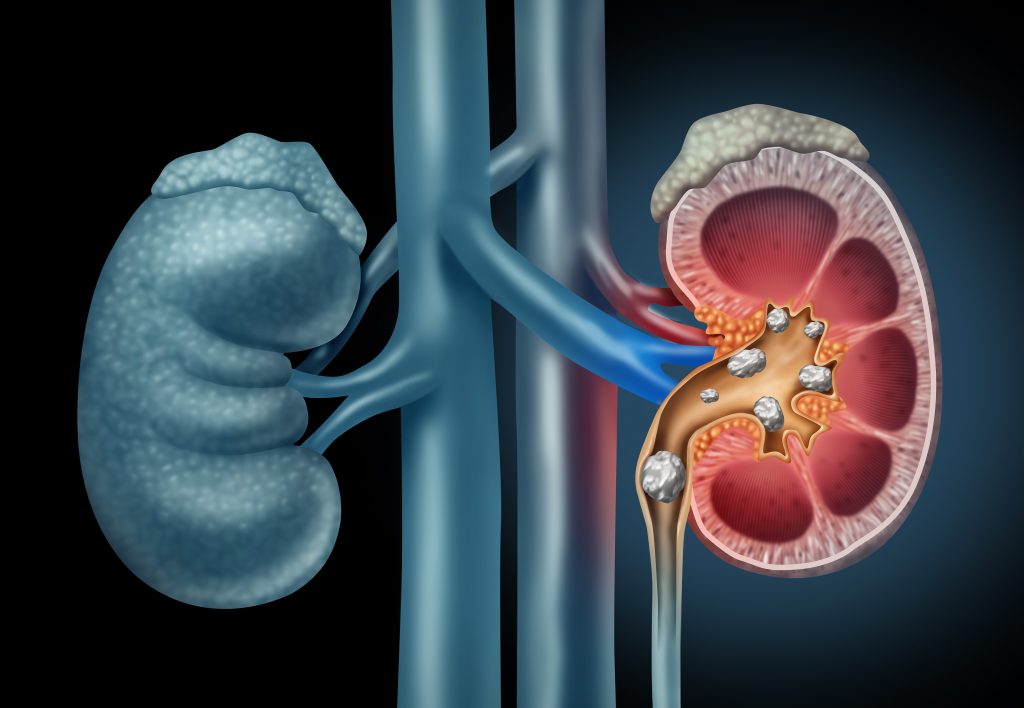Kidney stones are a painful condition caused by the presence of mineral crystals in the kidneys. These crystals get form a stone, that can get stuck anywhere in the renal system, and cause a lot of pain. And while kidney stones do not cause lasting damage, they can be extremely painful, meriting an urgent visit to the top nephrologist in Lahore.
Symptoms of Kidney Stones
A characteristic of the kidney stones is that it has pain coming in wave. It originates in the mid back and side and radiates to the pelvis or groin. Some people also have burning sensation when they urinate.
Other, less common signs of kidney stones include blood in the urine, as evident by the color of the urine which tends to be either red, brown or pink. Some people also experience vomiting and nausea alongside the pain.
Smelly or discolored urine is also an indicator of the kidney stones. Patients also have greater urge to pee or urinate in small amounts only. Fever and chills are also a symptom, where the condition is result of some infection.
Types of kidney stones.
Excess or deficit of different minerals in the body can contribute to this very painful condition. It is important to diagnose and know which mineral is causing the production of the stones, as the prevention mechanism is contingent on this realization.
Calcium stones are formed when foods rich in the different calcium compounds like calcium oxalate are consumed. Similarly, uric acid stones are formed when diet rich in protein is consumed by people suffering from medical conditions like gout.
Whereas uric acid stones are more common in men, struvite stones occur mainly in women. These are a consequence of UTIs and treating these can help in remedying kidney stones as well.
A rare form of stones are the cystine stones, that are caused on account of a genetic disease, cystinuria.
Risk factors for kidney stones
Some people are more prone to developing the stones. People with family history of kidney stones have higher chance of having this condition. Moreover, kidney stones are more common in white men, ages 20-50.
Dehydration is also an important risk factor of kidney stones. Producing less than a liter of urine in a day is a precursor of this painful condition.
Preventing Kidney stones
Anyone who has had kidney stones can vouch for their sheer, unbearable pain they cause. This condition can occur anytime in anyone. Hence, rather than acting frisky, it is best to take the precautionary measures.
These are specially imperative for people who already have had this condition or those with high risk factors of the disease. Taking care of the following factors can help evade the condition or at least decrease the frequency of the stone formation.
Hydrate, and then some!
Water is life, especially for those predisposed towards kidney stones. Water helps to dilute the minerals that lead to the production of the stones. Moreover, not producing enough urine also leads to the stones.
Hence, it is vital to properly hydrate yourself. People should aim at production of around 2 liters of urine, and thus drink water accordingly.
Take citrus fruits
Not only are the citric fruits very refreshing but are also great for kidneys as well. Citric acid in these fruits prevents the formation of stones. Alongside directly consuming fruits like lime, oranges etc., making refreshing beverages from them is also a great way to hydrate and amp up the water intake.
Watch your protein intake
Uric acid is contributed by animal meat, and excess of it leads to the production of stones. Hence, people at risk of developing stones need to moderate their protein intake.
Stop overdoing sodium
Kidneys have to overwork when the salt intake is too much or unregulated. Hence, those with propensity towards developing the stones or already have the history of it need to be watchful over how much sodium they are consuming.
It is especially vital for people with high cystine and calcium levels to be vigilant about their salt intake.
Best to avoid certain foods
Foods like chocolate, spinach, tea, nuts etc. are rich in oxalate, one of the principle contributors of kidney stone. Limit all such foods; abstinence is better than the pain after all!
Adequate calcium intake
Whereas calcium stones are a type of kidney stone, however, eating sufficient calcium can actually help avert the risk of stone formation. It helps to reduce the amount of oxalate that makes it to the kidneys and leads to kidney stones.
But, be careful about not overdoing it either. Talk to the top kidney specialist in Karachi about how much calcium you should be taking, and resort to supplements only when the dietary sources fall short of delivering the required amount.




